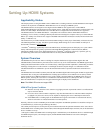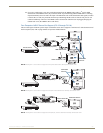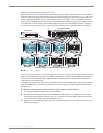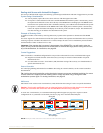
Setting Up HDMI Systems
60
Instruction Manual – HDMI-UTPRO-0808
Setting Up HDMI Systems
Applicability Notice
This chapter pertains to using the HDMI UTPro’s HDMI matrix switching connectors and the HDMI and UTP transport
connectors in conjunction with HDMI-UTPRO-RX Receivers for setting up an HDMI system.
The HDMI connectors are designed to route high-resolution HDMI or DVI signals with or without HDCP
(High-bandwidth Digital Content Protection). DVI signals must be, single-link DVI signals and are connected only with
the use of a cable adapter. Destination devices with either DVI-I or single-link DVI-D connectors are supported.
The HDMI connectors are HDMI and HDCP 1.3 compatible. The connectors feature AMX HDCP InstaGate
®
Technology* for low-latency switching of HDCP protected content and supports computer video up to 1920x1200 and
HDTV up to 1080p. The connectors also support embedded audio both linear PCM (stereo audio) and non-linear PCM
(Dolby 5.1 and DTS 5.1).
The connectors are pre-loaded with the most common EDID settings to ensure proper functionality with source devices.
The EDID Programmer (see page 101) allows specific display EDID settings to be custom loaded on each input if
desired and is available at www.amx.com.
* InstaGate
®
Technology significantly reduces the HDCP latency and interruptions on all displays in a system. HDCP
latency and interruptions are typically experienced when High-Bandwidth Digital Content Protection (HDCP)
authenticates HDMI or DVI source and destination devices. InstaGate
®
Technology effectively “opens the gate” by
pre-authorizing connected source and destination devices to satisfy HDCP authentication.
System Overview
The HDMI UTPro provides true matrix switching for complete distribution of high resolution digital video and
embedded audio (cannot breakaway the audio) from 8 sources to any or all of 8 destinations. Full HDMI support allows
1080p protected entertainment content to be switched freely, while high resolution capabilities (1920x1200) provide the
advantage of being able to use this solution to switch high resolution computer images or a combination of both.
The HDCP standard was established to prevent the unauthorized transfer of protected audiovisual content between
devices.
The HDMI UTPro routes HDCP (content-protected) and non-HDCP digital audiovisual signals. If HDCP is applied, the
transmitted video is encrypted. The HDMI matrix switching input connectors act as HDCP receivers (RXs), and the
output connectors act as HDCP transmitters (TXs). If the content is protected (HDCP), the HDMI UTPro acts as an
HDCP repeater, allowing the source device to authenticate each destination device (and repeater) that it is routed to.
Once the authentication is complete, the encrypted content begins to display on the destinations.
Note: The HDMI UTPro does not support CEC.
HDMI UTPro System Conditions
HDCP is used only when the source content is copyright protected. Unprotected content is not affected and
may be routed as desired.
If a source device enforces HDCP compliance, only those destination devices which are HDCP compliant
(as judged so by the source device) will be capable of displaying the source’s HDCP protected content.
Each HDMI matrix switching input on the HDMI UTPro supports a maximum of 16 downstream devices,
which are referred to as sinks (destination devices and repeaters).
Normally, all devices used in an HDMI system are HDCP compliant. Each HDCP capable device model has a unique set
of confidential keys (used to encrypt and decrypt the data).
The content protection process for the point-to-point connection between the upstream transmitter on the source device
and an HDMI matrix switching input connector (RX) and on through the HDMI output connector (TX) to the destination
device* includes five steps.
* This applies whether the HDMI matrix switching output is cabled directly to the destination device or cabled through
the HDMI transport inputs, UTP transport outputs, and the HDMI-UTPRO-RX Receivers before reaching the
destination device.


















